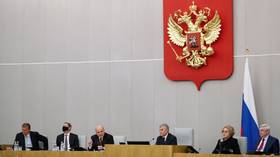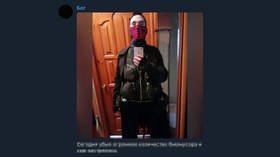Top Russian lawmaker mulls ending internet anonymity after threatening online posts emerge from suspect in Kazan school shooting

Russia’s most senior MP has confirmed that the country’s parliament may soon consider proposals to put an end to anonymous online accounts, in the wake of the bloody school shooting in Kazan that has claimed at least nine lives.
In a statement posted to Telegram on Tuesday, Vyacheslav Volodin, the speaker of the State Duma, said that parliamentarians were preparing a response to the "inhuman and brutal" atrocity.
"The world has changed greatly over the past few decades," he said. "New technologies like the internet are available to all, and they have brought not only progress, but also problems, which have turned into serious threats, especially to children. Children's health, their wellbeing – even their lives."
Volodin added that existing legislation does not go far enough "to prevent teenagers getting into online communities that distort realities and lead to violence and suicide... the tragedy in Kazan proves this."
Ilnaz Galyaviev, a 19-year old former student at School No. 175, had made a series of chilling posts online ahead of launching the attack that left seven children and two staff members dead, and more than a dozen injured. Posting on a Telegram channel he'd set up the previous week, Galyaviev claimed "I am like a God" and set out his twisted vision for how to wipe out humanity.
Volodin confirmed on Tuesday that, as part of the legislative changes being considered by MPs, "proposals have been made to move away from anonymity on the Internet, which will, according to supporters of the idea, reduce the amount of content that advocates violence or glorifies extremism many times over."
These problems, he said, "need to be discussed," but acknowledged that it is "far from a good thing that we are starting to think about this only after the tragedy has already happened."
The unfettered use of untraceable online accounts for posting on social media has long proven controversial in Russia. In 2018, President Vladimir Putin said that “on one hand, anonymity on the internet must be a good thing – this is democracy – but on the other hand, this causes a lot of problems because no one knows who hides behind internet nicknames."
Also on rt.com Plans to require social media users to share passport details when signing up for new accounts scrapped by Russian media regulatorIn March, Roskomnadzor, the country’s digital regulator, published draft legislation that would force would-be users to upload documents like passports as well as postal addresses in order to set up new accounts. However, the agency quickly reversed the policy and retracted the proposed legislation.
Earlier that month, Roskomnadzor began slowing connection speeds on Twitter in Russia over claims the San Francisco-based firm “does not remove content that incites minors to commit suicide, [and] contains child pornography or information about the use of drugs.”
Like this story? Share it with a friend!














